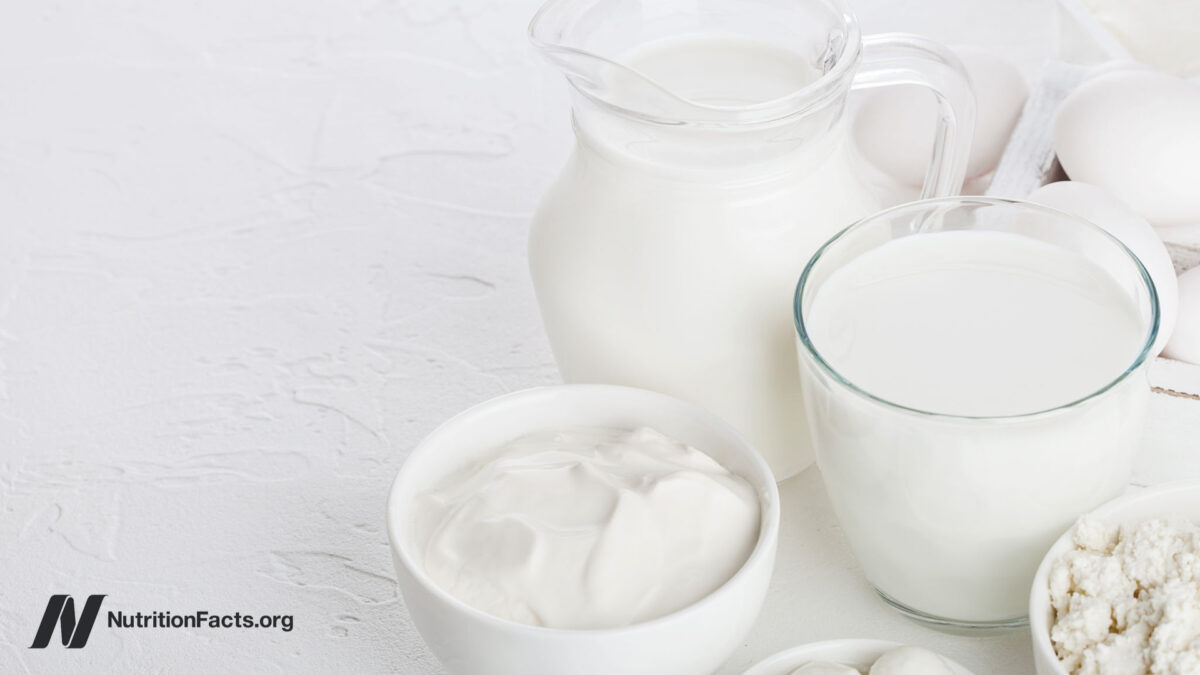How do we explain dairy consumption’s association with increased risk of prostate cancer but decreased risk of colon cancer?
Studies comparing country-by-country cancer rates “have shown up to a 70-fold variation in the incidence of prostate cancer worldwide with low rates in parts of Asia and Africa and high rates in North America, Australia, New Zealand, and Northern Europe.” Below and at 0:23 in my video Friday Favorites: Dairy and Cancer, you can see a map of prostate cancer mortality. Could dairy consumption play a role? Northern Europeans, Americans, and Australians drink a lot of milk, whereas most non-Caucasians in the world are lactose-intolerant. But, just because a country drinks a lot of milk and has a lot of cancer doesn’t mean its residents who are drinking the milk are getting the cancer. That’s why we need cohort studies, where you find out how much milk people drink, follow those individuals over time, and see if those who drink more milk get more cancer.
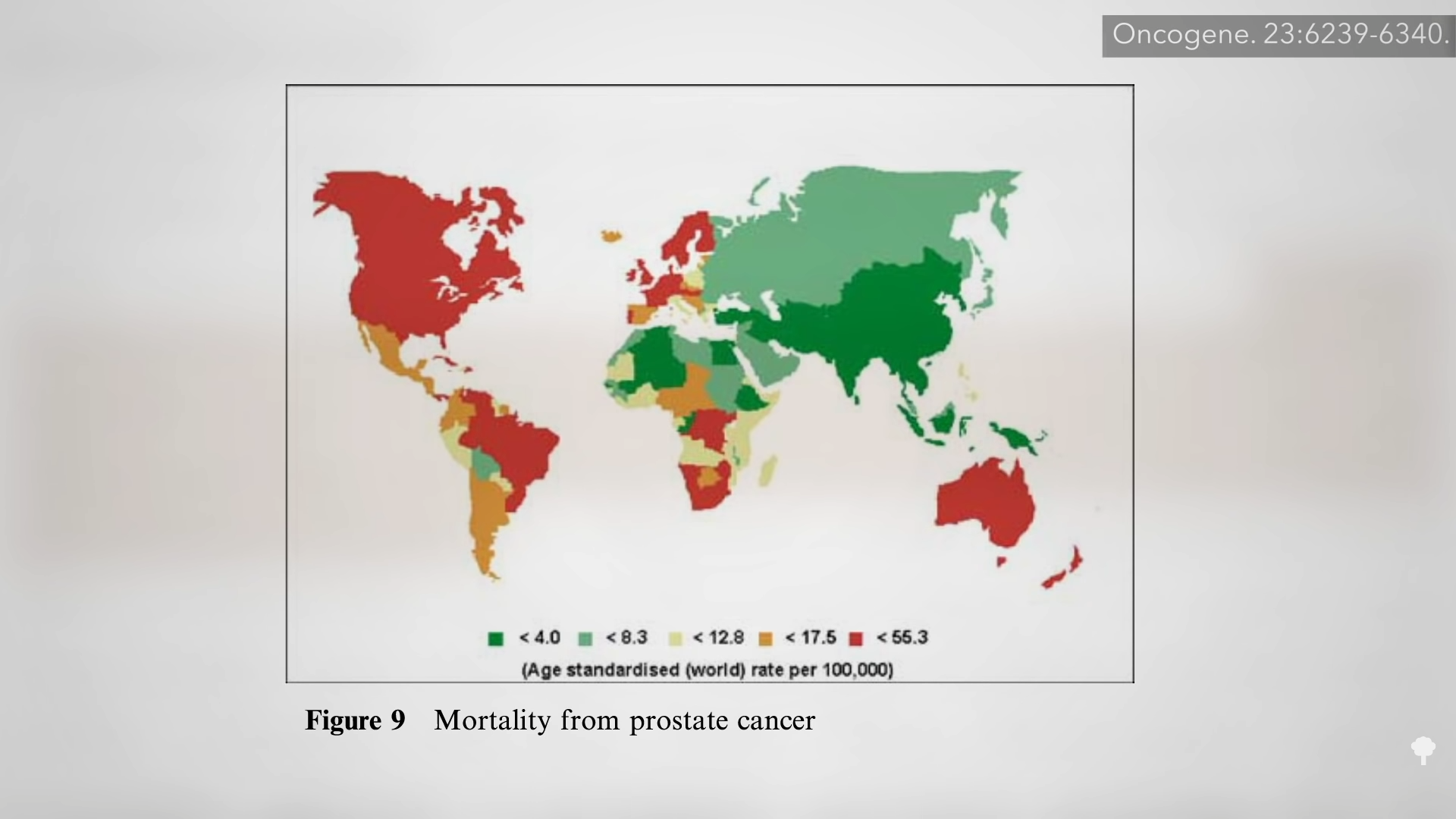
There have been dozens such studies. If you put them all together, intakes of total dairy products, including low-fat milk, were indeed associated with increased prostate cancer risk. Why is this the case? Maybe it’s all of the calcium. As you can see in the graph below and at 1:17 in my video, the investigators found the more calcium people consumed, the higher their risk of prostate cancer. This may be true, but most people get their calcium from dairy, so how do we know this isn’t just a dairy effect? Before we start worrying about kale and other non-dairy sources of calcium, it would be nice to see dairy calcium teased out from non-dairy calcium intakes—and that’s exactly what the researchers did. Their findings? Indeed, the more calcium from dairy sources, the higher the risk of cancer, but non-dairy sources of calcium were found to be protective. So, it wasn’t a calcium effect; it was a dairy effect. This suggests other components of dairy may be to blame.
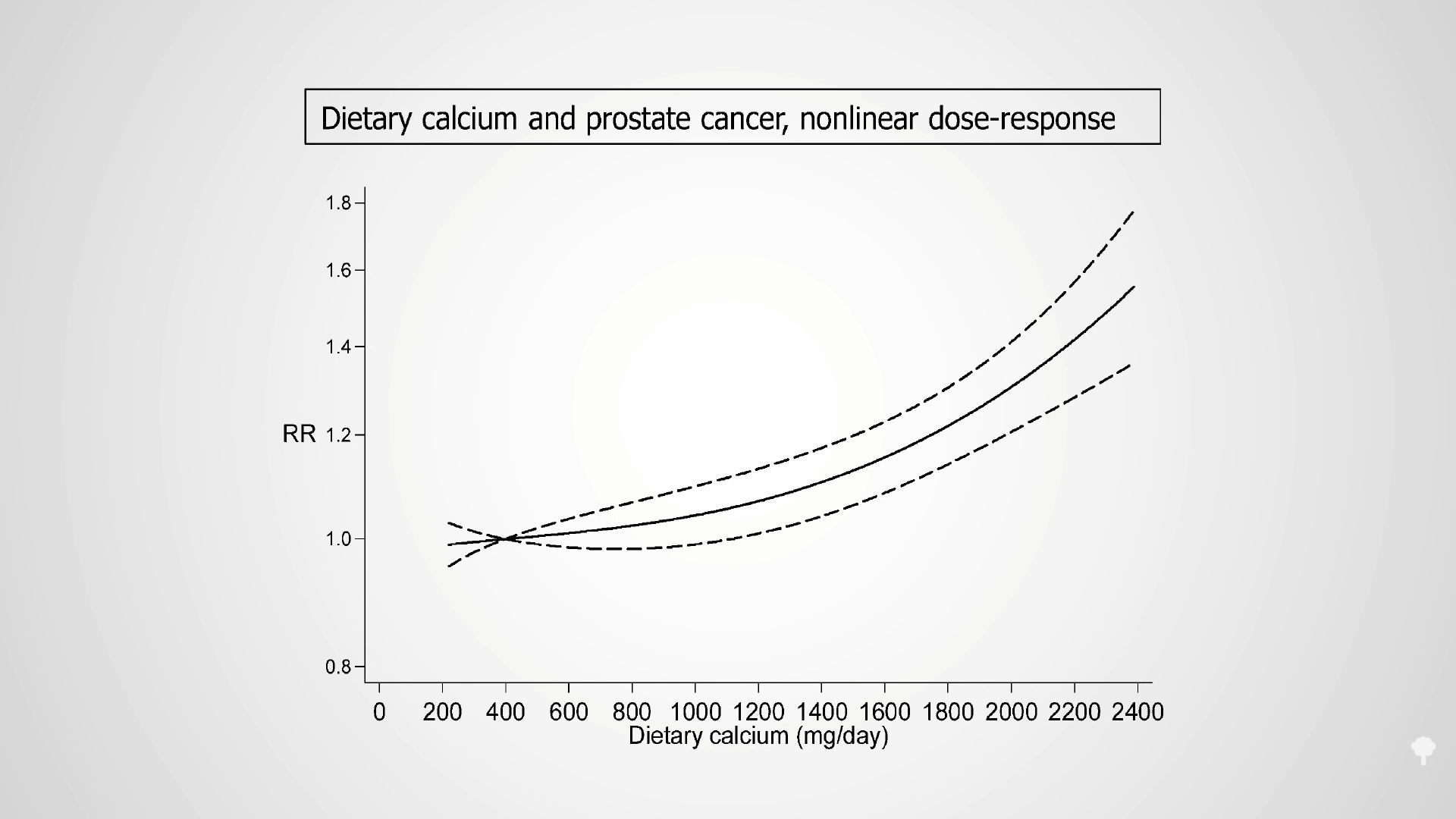
The results suggest it’s the animal protein, which boosts the levels of a cancer-promoting growth hormone called insulin-like growth factor 1 (IGF-1). Below in the graph and at 2:08 in my video, you can see an albatross plot showing the findings from 28 studies involving nearly 28,000 people. There is a clear link between higher IGF-1 levels and consumption of dairy products, milk specifically, or dairy protein.
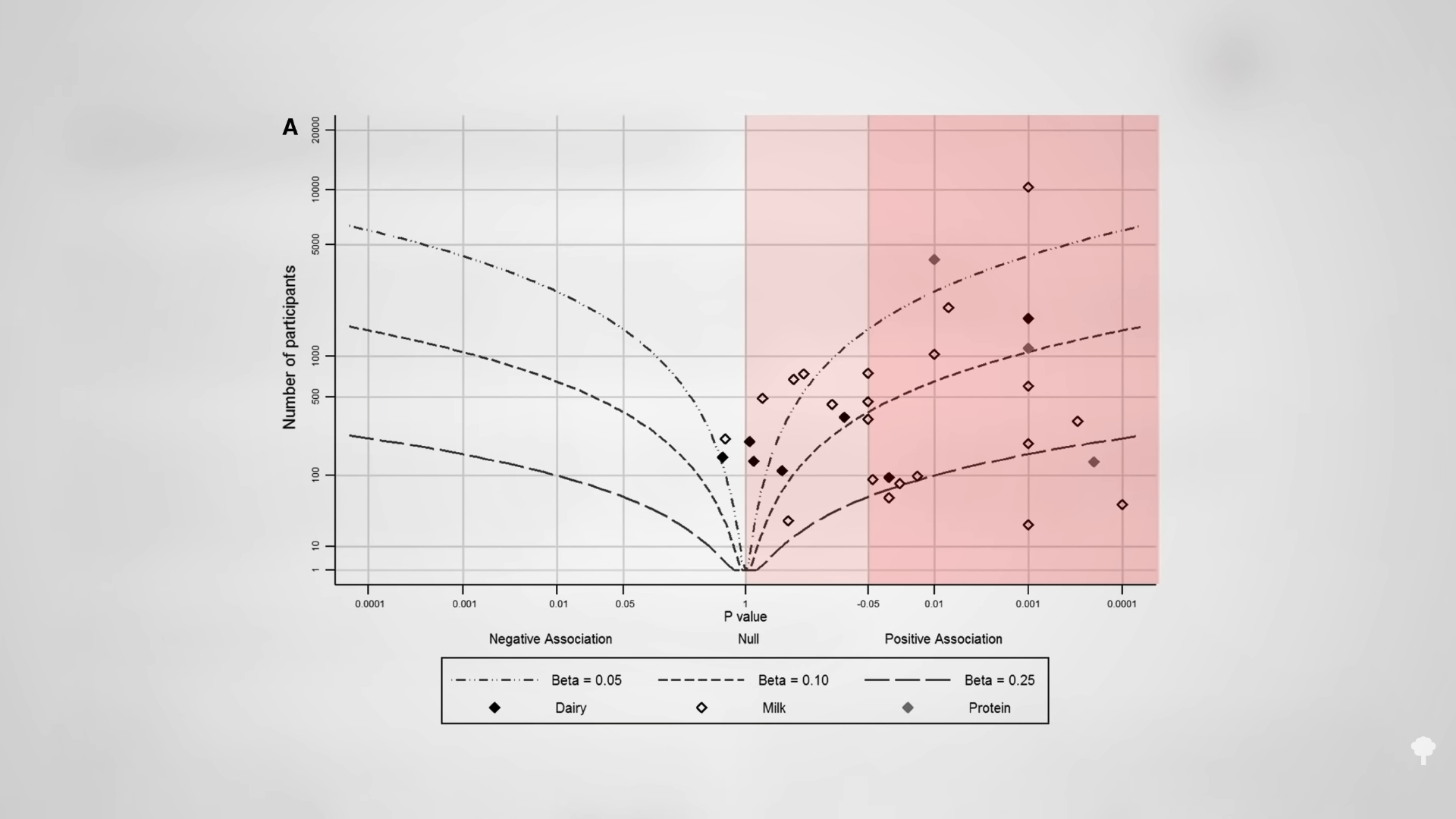 This could also explain why plant-based diets can be so protective. Put watch-and-wait prostate cancer patients on a whole food, plant-based diet for a year, without chemotherapy or radiation, just lifestyle changes, and we see a significant reduction in PSA levels. This is indicative of tumor shrinkage, with their bloodstream becoming nearly eight times better at suppressing the growth of cancer cells. As you can see below and at 2:59 in my video, biopsies show changes in gene expression. This downregulation of critical cancer genes effectively switches off cancer growth genes at a genetic level. Conversely, if you eat a lot of dairy after a prostate cancer diagnosis, you may suffer a 76 percent higher risk of death overall and a 141 percent increased risk of dying specifically from your cancer.
This could also explain why plant-based diets can be so protective. Put watch-and-wait prostate cancer patients on a whole food, plant-based diet for a year, without chemotherapy or radiation, just lifestyle changes, and we see a significant reduction in PSA levels. This is indicative of tumor shrinkage, with their bloodstream becoming nearly eight times better at suppressing the growth of cancer cells. As you can see below and at 2:59 in my video, biopsies show changes in gene expression. This downregulation of critical cancer genes effectively switches off cancer growth genes at a genetic level. Conversely, if you eat a lot of dairy after a prostate cancer diagnosis, you may suffer a 76 percent higher risk of death overall and a 141 percent increased risk of dying specifically from your cancer.
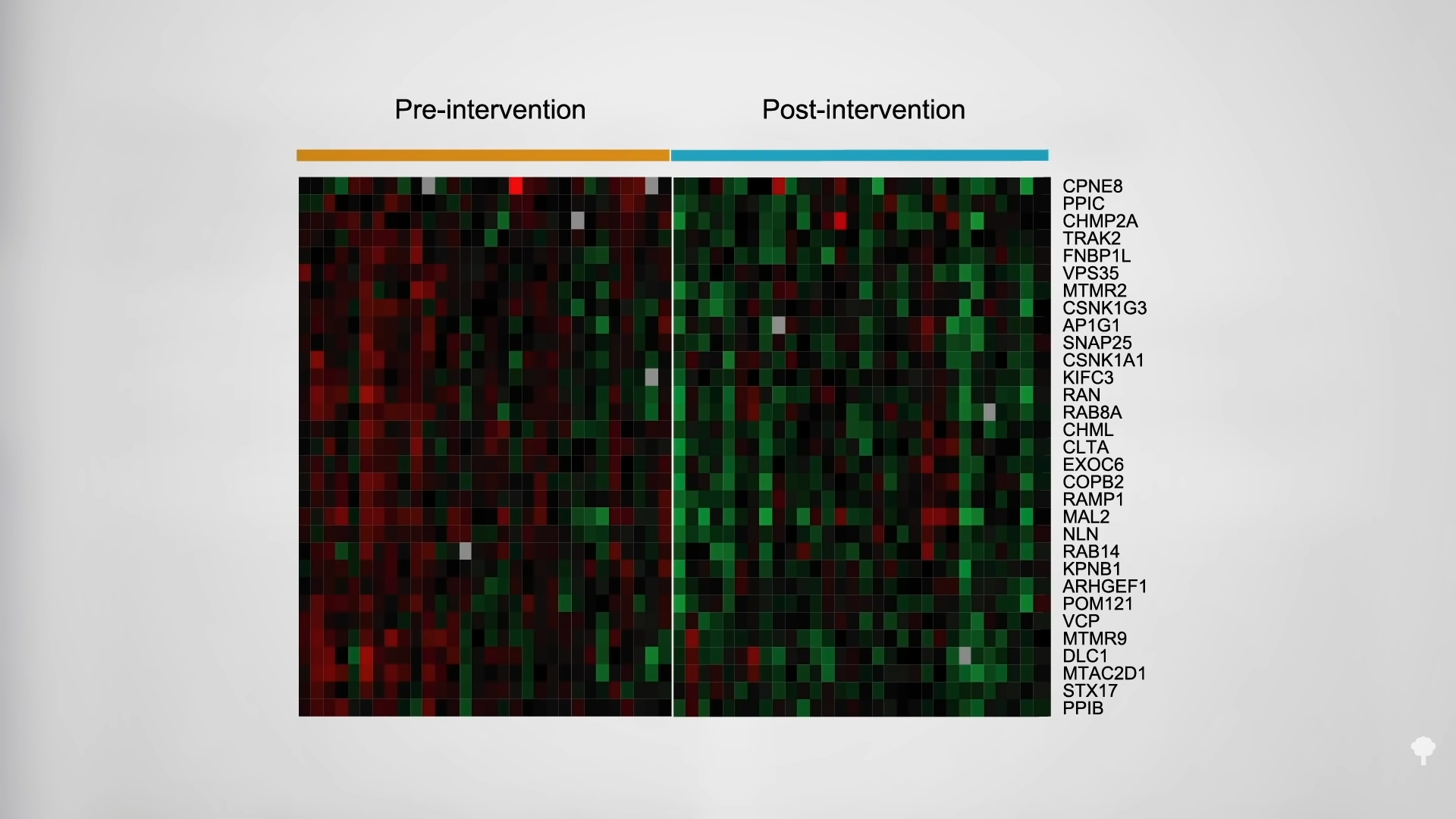
Even without IGF-1, the milk protein casein appears to be a cancer cell proliferation-promoting factor, increasing the growth of prostate cancer cells (at least in a petri dish, as you can see below and at 3:30 in my video). The same is true for whey, the other major animal protein in dairy. Nearly 100 percent of advanced prostate cancers thrive by upregulating a growth enzyme called TOR. Dairy protein boosts TOR signaling even higher, which only makes sense. Calves have to grow 40 times faster than human babies, so cow’s milk has to be packed with growth promoters, not to mention the hormones—especially from cows who are typically already impregnated again on the dairy farm.
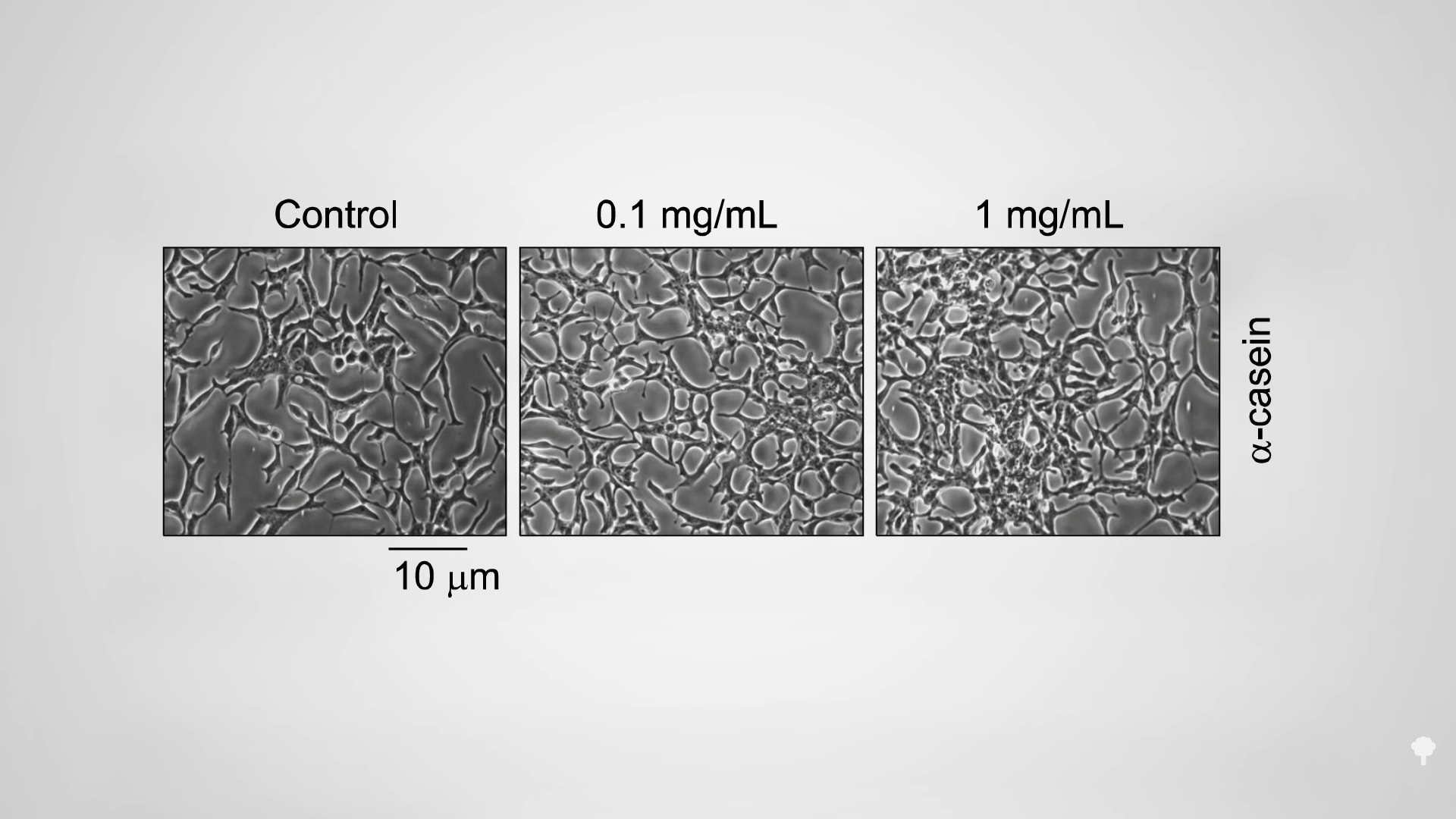 “Commercialized milk production by pregnant cows releases uncontrolled amounts of bovine steroids [hormones] into the human food chain.” As such, the combination may well “explain the observed association between high dairy consumption and increased risk” of prostate cancer.
“Commercialized milk production by pregnant cows releases uncontrolled amounts of bovine steroids [hormones] into the human food chain.” As such, the combination may well “explain the observed association between high dairy consumption and increased risk” of prostate cancer.
“From an evolutionary perspective…the persistent ‘abuse’ of the growth-promoting signaling system of bovine milk by humans over their entire life span”—not drinking milk only during infancy—“maintains the most important hallmark of cancer biology, i.e., sustained proliferative signaling” to grow, grow, grow. So, there’s interest in trying “to define safe upper limits for long-term milk and dairy intake for the prevention of the most common dairy-promoted cancer in men.” But if you look at diet and cancer guideline recommendations, milk may increase risk of prostate cancer, “however, no recommendation was provided for [cutting down on] calcium and dairy intakes because the evidence for prostate cancer conflicted with decreased risk of colorectal cancer with high milk intake.” High dairy intake is associated with increased prostate cancer risk, but decreased colon cancer risk. So, it’s like how alcohol may be an “intoxicating carcinogen,” but “policymakers hesitate to introduce effective alcohol policies, or even to support the addition of cancer warning labels on alcohol containers, for fear they might undermine or contradict possible health benefits of alcohol use.” Is dairy really protective against colon cancer?
If you put all the cohort studies together, where researchers measured dairy consumption and then followed people for years to see who got cancer, milk and total dairy consumption was indeed associated with a reduction in risk of colorectal cancer, one of our deadliest cancers. Now, people who drink more milk tend to exercise more, smoke less, drink less, and eat less meat, which could explain some of the association. However, many of the studies adjusted for these kinds of confounding factors. More likely it was the protective effects of the calcium, which may bind up pro-inflammatory bile acids in the gut, though high-fat dairy products like cheese may actually increase bile acids, explaining why cheese appeared to cancel out the calcium benefit. So, might we be able to get the best of both worlds by consuming non-dairy calcium sources?
As you can see below and at 6:44 in my video, if you randomize people to calcium supplements, you can get a significant reduction in recurring colon polyps, which can otherwise turn into cancer, but calcium pills have been associated with adverse cardiovascular effects. So, in the best of all worlds, if you want to take a precautionary approach in terms of nutrition and cancer, you should obtain calcium through low-oxalate, dark-green leafy vegetables, beans, split peas, chickpeas, and lentils, or, if necessary, calcium-fortified foods such as soy or almond milk.

